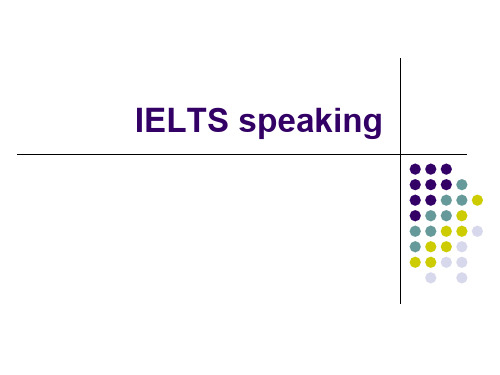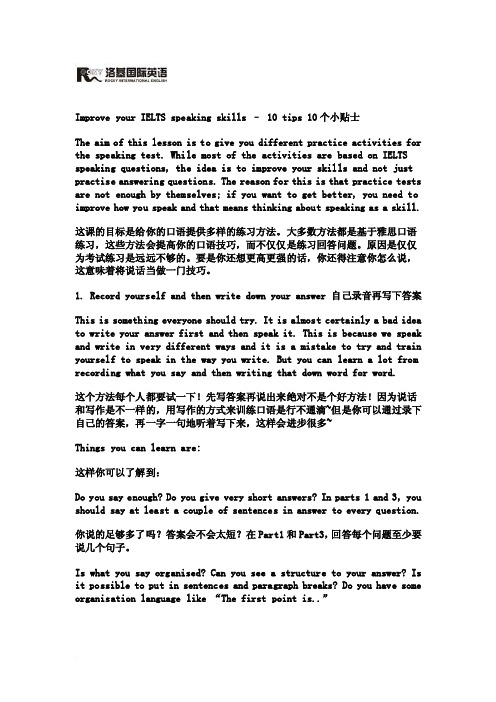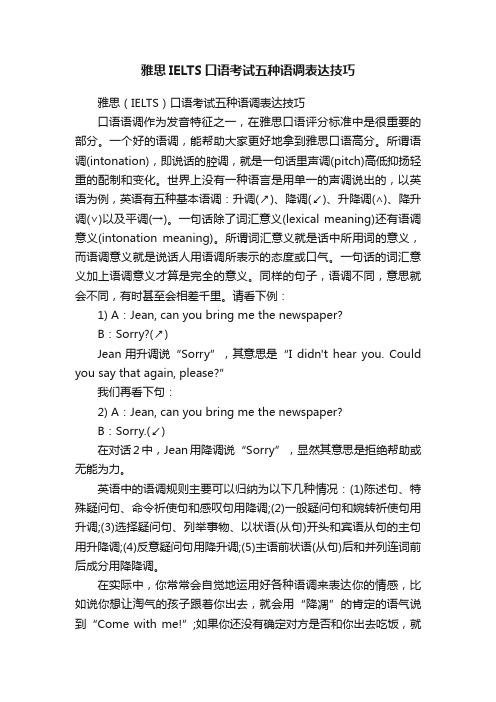IELTS Speaking Tips
如何在雅思口语考试中流利表达

如何在雅思口语考试中流利表达雅思(IELTS)口语考试是全球英语考试中的重要组成部分,对于考生来说,如何能够在口语考试中流利表达是十分关键的一个技能。
下面将介绍一些提高雅思口语流利表达的技巧和方法。
一、扩大词汇量拥有丰富的词汇量是流利表达的基础。
在备考过程中,考生应注重积累词汇,包括常用词汇和雅思口语常考的话题词汇。
可以通过背单词、阅读英语原著、听英语歌曲等方式来扩大词汇量,同时积极运用所学词汇进行口语练习。
二、多听多模仿多听英语材料对于提升口语表达能力大有裨益。
可以选择听一些英语新闻、英语教学节目、英语电影等有声资源,通过模仿来提高自己的发音、语调和表达方式。
可以有意识地模仿别人的流利表达,逐渐形成自己的语感。
三、注重口语练习口语考试需要考生对问题能够快速作出回应,因此,平时的口语练习非常重要。
可以选择与同学、朋友或者外教进行口语练习,提高对话的流畅性和连贯性。
在练习过程中可以运用一些常用的口语表达,例如“in my opinion”(在我看来)、“as far as I'm concerned ”(就我所知)、“in a nutshell”(简言之)等,这些表达可以帮助考生更流利地用英语表达自己的想法。
四、培养思维的英文习惯要想在雅思口语考试中流利表达,考生需要具备从思维到表达的一套过程。
平时积极培养英文思维习惯,将生活中的所见所闻通过英语的思考方式来加工,从而提高思维的敏捷性和表达的流利性。
可以记录一些生活中的片段和感悟,将其用英语写下来,并尽量用英语来与他人交流。
五、注意语音语调在雅思口语考试中,语音语调是很重要的一部分。
要想表达流利,不仅需要正确发音,还需要注意语调和语速。
可以通过录音和听录音的方式来自我评估,并适当调整自己的语音语调。
总之,要想在雅思口语考试中流利表达,需要从词汇量、听力、口语练习、思维习惯以及语音语调等多方面进行提高。
只有通过不断的练习和积累,才能够在口语考试中使用流利的英语表达自己的观点和想法。
IELTSspeaking(新航道名师口语攻略)

Well, we are all living in a world where ... is becoming more and more important.
It is very hard to imagine how someone can survive without doing ...;
Activities Objects
Habits/custo Laws ms
Dull/boring Not userfriendly
Out-dated unfair
Tiring/exhau Overly-
A little
oppressive
sting
complicated ridiculous
Time-
And obviously, it has become the one of the very few things that can't be measured in terms of money.
Giving and supporting opinions- a basic native speaker discussion skill
Skill 1: Illustrating advantages
Well, this has already become the "talk of the town" today.
First, it has millions of advantages. The first advantage I can think of is ..., another good thing is ...;
4. Attitude
Do you think it is better for families to live close together?
ImproveyourIELTS...

Improve your IELTS speaking skills – 10 tips 10个小贴士The aim of this lesson is to give you different practice activities for the speaking test. While most of the activities are based on IELTS speaking questions, the idea is to improve your skills and not just practise answering questions. The reason for this is that practice tests are not enough by themselves; if you want to get better, you need to improve how you speak and that means thinking about speaking as a skill.这课的目标是给你的口语提供多样的练习方法。
大多数方法都是基于雅思口语练习,这些方法会提高你的口语技巧,而不仅仅是练习回答问题。
原因是仅仅为考试练习是远远不够的。
要是你还想更高更强的话,你还得注意你怎么说,这意味着将说话当做一门技巧。
1. Record yourself and then write down your answer 自己录音再写下答案This is something everyone should try. It is almost certainly a bad idea to write your answer first and then speak it. This is because we speak and write in very different ways and it is a mistake to try and train yourself to speak in the way you write. But you can learn a lot from recording what you say and then writing that down word for word.这个方法每个人都要试一下!先写答案再说出来绝对不是个好方法!因为说话和写作是不一样的,用写作的方式来训练口语是行不通滴~但是你可以通过录下自己的答案,再一字一句地听着写下来,这样会进步很多~Things you can learn are:这样你可以了解到:Do you say enough? Do you give very short answers? In parts 1 and 3, you should say at least a couple of sentences in answer to every question.你说的足够多了吗?答案会不会太短?在Part1和Part3,回答每个问题至少要说几个句子。
Tips for IELTS speaking

Eelke – Holland – 25 years old – Assistant buyerI’m Eelke, I’m 25, I’m from Holland, and I’ve got band 7 in IELTS. I’m an assistant buyer. My tip for the speaking test is: try to talk about what you know rather than general ideas. Good luck with your exam!Jiten – Sri Lanka – 26 years old – LawyerI’m Jiten. I’m 26 years old and I’m from Sri Lanka. I got band 8 on my IELTS and I’m now a lawyer. My top tip is for the speaking test: practise speaking at length. Talk to yourself on a variety of topics. Record yourself and listen back to see if you sound interested. Practise stressing key words to sound more interested. Best of luck with your exam!Joyce – Hong Kong – 24 years old – ArchitectMy name is Joyce. I’m 24 years old. I’m from Hong Kong. I got band 7.5 in IELTS and I’m an architect. My tip for the speaking test is: it’s OK to ask the examiner to repeat the question. Aiming high, study skills for IELTS!Paul – Pakistan – 23 years old – Studying medicineMy name is Paul. I’m 23 years old. I’m from Pakistan. I got 7.5 on my IELTS. I’m studying medicine. My top tip for the speaking test: watch the tense in the question. Is it past, present or future? Make a note of it. Go for IELTS with the British Council!Raphael – France – 28 years old – JournalistMy name is Raphael and I’m 28 years old. I’m from France and I got 7 on my IELTS exam. I’m now a journalist. My top tip is for the speaking test:if you can’t remember a word in English, try to describe it. Good luck in your IELTS exam.。
雅思IELTS口语考试五种语调表达技巧

雅思IELTS口语考试五种语调表达技巧雅思(IELTS)口语考试五种语调表达技巧口语语调作为发音特征之一,在雅思口语评分标准中是很重要的部分。
一个好的语调,能帮助大家更好地拿到雅思口语高分。
所谓语调(intonation),即说话的腔调,就是一句话里声调(pitch)高低抑扬轻重的配制和变化。
世界上没有一种语言是用单一的声调说出的,以英语为例,英语有五种基本语调:升调(↗)、降调(↙)、升降调(∧)、降升调(∨)以及平调(→)。
一句话除了词汇意义(lexical meaning)还有语调意义(intonation meaning)。
所谓词汇意义就是话中所用词的意义,而语调意义就是说话人用语调所表示的态度或口气。
一句话的词汇意义加上语调意义才算是完全的意义。
同样的句子,语调不同,意思就会不同,有时甚至会相差千里。
请看下例:1) A:Jean, can you bring me the newspaper?B:Sorry?(↗)Jean用升调说“Sorry”,其意思是“I didn't hear you. Could you say that again, please?”我们再看下句:2) A:Jean, can you bring me the newspaper?B:Sorry.(↙)在对话2中,Jean用降调说“Sorry”,显然其意思是拒绝帮助或无能为力。
英语中的语调规则主要可以归纳为以下几种情况:(1)陈述句、特殊疑问句、命令祈使句和感叹句用降调;(2)一般疑问句和婉转祈使句用升调;(3)选择疑问句、列举事物、以状语(从句)开头和宾语从句的主句用升降调;(4)反意疑问句用降升调;(5)主语前状语(从句)后和并列连词前后成分用降降调。
在实际中,你常常会自觉地运用好各种语调来表达你的情感,比如说你想让淘气的孩子跟着你出去,就会用“降凋”的肯定的语气说到“Come with me!”;如果你还没有确定对方是否和你出去吃饭,就可以用“升调”问到“Come with me?”,表示“和我出去怎么样啊”这种“试探性”的语气;细细体会起来,“场合用什么语调”还真是很自然的事情。
雅思口语备考IELTSSpeakingTips

雅思口语备考IELTSSpeakingTipsPart 1 (Interview)Part 1 of the IELTS Speaking test lasts between 4 and 5 minutes. The examiner will ask some simple 'getting-to-know-you' questions which will help the examiner find out a little about you and help put you at ease. These will be general questions such as about your family, your studies, where you come from or what your interests are.Example QuestionsQ: Where are you from?Q: Why are you studying English?Q: Have you visited any English speaking countries?Q: Do you play any sports?Tips!Giving full, relevant answers to the examiner's questions will help get the interview off to a good start.1) Avoid giving short, uncommunicative replies.Q: Where are you from?A: I'm from Hoorn in the Netherlands. (Don't stop there!) It's about 35 kilometers north of Amsterdam. It's a modern city but with a lot of history and a lovely place to live.2) Avoid short, 'yes', 'no' answers to closed questions. (These are questions beginning 'Have you ...', 'Do you ...', 'Is it ...' etc which can be answered simply with a yes or no answer). Q: Have you visited any English speaking countries?A: Yes. (Don't stop there!) I went to England last year and spent two weeks seeing the sights.A couple of years ago I went to New York with my parents and had a great time.Q: Do you play any sports?A: No. (Don't stop there!) I'm not really interested in playing sports. I like watching sport on TV and I really enjoyed keeping up with the Olympics recently.3) Offer examples to help you explain a statement.Q: Why are you preparing for the IELTS exam?A: Because I need it for my studies. (Don't stop there!) I've been offered a place at a university in England to study on an MBA but I need to show my level of English is good enough. Part 2 (Long Turn)Part 2 of the IELTS Speaking test lasts between 3 and 4 minutes (including 1 minute preparation time). The examiner gives you a task card and you have to speak about the subject without interruption for between 1 and 2 minutes.Example TaskExample 1) Describe a place you have visited that you have fond memories of.You should say:where this waswhy you went therewhat you did thereand what it was about the place that makes it so memorable.Example 2) Describe your favourite personal possession.You should say:what this possession iswhen you first got itwhen you use itand why it's so important to you.Tips!1. Use your 1 minute preparation time wisely and make notesof the points you'd like to make.2. The question will help you with the structure of your talk. The introduction can include the item itself and maybe a brief description. The main body of your talk could describe the situation when you acquired the object and go on to explain when you use it. You can then end with an explanation of why the object is so important.3. Try to avoid giving a very dry, unimaginative introduction such as 'The object I'm going to describe is ....'. Get your talk off to a memorable start with something on the lines of: 'If I was about to lose everything and could only save one thing it would be my ...', or 'I've got several things that mean a lot to me but the one that really stands out is my ...'4. If you're concerned about not having enough to talk about for 1 to 2 minutes or running out of time before you've finished, the answer is to practise as often as possible. Time yourself and ask a friend for feedback.Part 3: (Two-Way Discussion)In Part 3 of the test, which lasts between 3 to 4 minutes, the examiner will ask you questions linked to the topic in Part 2.Example Questions (Based on example topics in Part 2 above) Q: It is sometimes argued that local cultures are being destroyed by tourism. Why do think people might feel this?Q: What benefits do people get from travelling to other countries?Q: Do you think people are becoming too materialistic?Q: To what extent are people's buying habits affected by advertising?Tips!1. If you need time to collect your thoughts use expressions(sparingly) like: 'That's a good question.', 'Well, let me think ...'.2. Don't forget to avoid short, 'yes', 'no' answers. Try to offer examples to back up a statement.3. Help make your contributions memorable. Try explaininga point using a short, personal anecdote.4. If the examiner asks a question that you don't understand, take control of the situation with questions such as those that appear below. Responding like this will show evidence of your communication skills.A) If the examiner uses a word or phrase that you don't understand, say something like: "Sorry but could you explain what you mean by ........" or"I haven't come across that word/expression before. Could you explain what you mean?"B) If you simply didn't hear something that was asked, respond with:"Excuse me, I didn't quite catch that. Could you say that again?""I'm sorry, but would you mind repeating that?"C) If you want to make sure you've understood what the examiner has asked you could say: "Do you mean ........""When you say ........, do you mean/are you asking ........?。
让雅思英语口语发音更地道表达的技巧

让雅思英语口语发音更地道表达的技巧雅思考试(IELTS),全称为国际英语测试系统(International English Language Testing System),是著名的国际性英语标准化水平测试之一。
下面是小编为您收集整理的让雅思英语口语发音更地道表达的技巧,供大家参考!让雅思英语口语发音更地道表达的技巧1.用心模仿模仿英语广播,电视节目和有代表性的电影,跟上他们说话的节奏,不要太在意内容,重点关注语音语调和语流,学习这些母语为英语的人士是如何说话的。
2. 放慢说话速度很多英语学习者常说语速太快容易养成他们的坏习惯。
由于太快而模糊不清是口语考试的大忌。
所以我们要accuracy 然后才是fluency,每天操练一些基本语言以单音节开始,然后单词,把几个词连在一起,组成句子。
这样你就能慢慢开始表达自己的思想了。
特别是在口语考试时,考官也希望看到语速适中的回答。
3. 发音也是运动发音是个形体动作,你有没有发现老外说话时嘴型比我们都要夸张很多。
要学会嘴巴的发声方法和移动肌肉的方式,可以每天集中训练几个音。
你发this, thank, they,和little, wool等单词困难吗?试试发‘th’,将你的舌头放在齿间(不要咬住)并从口中吐气。
感受气流从你的舌间吹过。
站在镜子前查看当你发某些固定音时的嘴型,唇型和舌头的位置。
如果你还是说汉语的发音习惯,那就要好好训练一下了。
4. 倾听自己的声音如果你不知道自己的发音情况如何,把你讲的话录下来并并反复听,和标准的发音相互对照,明确自己的弱点和缺陷。
5. Find a Partner or Foreign Friend找一个对提高英语水平同样感兴趣的朋友, 可以两个人经常做模拟面试,尽量多的使用英语,互相纠正对方的发音错误,但也要找出亮点。
6 发音有节奏好的发音不仅是掌握单独的音节。
还是对intonation (声音的升降调)和stress (对单词中一些音节和句子中的一些单词更大声更清晰的发音)的理解。
雅思口语技巧与注意事项

雅思口语技巧与注意事项1。
在结束雅思笔试后弄清自己口语考试的时间,地点。
2。
口语考试实际是考察考生在实际语言环境中运用语言的能力,如何与人交流如何与人沟通。
因此口语的考试有很大的主观性与随意性。
因此需要明确以下几点1)以很自然的态度来应对口语考试,表现为考试前平静,和考官自然而主动的打招呼,在整个过程中将是一种犹如实际生活中对话的情景2)在此阶段会准备网络上流行的口语主题,而我们利用此的目的在于熟悉话题,事先准备来克服考试中的紧张状态,但是不可能去背诵其中的内容与观点,所背诵的就只有一些比较陌生的话题或者是你个人不熟悉的领域(如玩具、建筑物等等)。
在9月份的考试后,口语的话题将会不断推陈出新,而实际的语言能力将会在实际中得以体现。
3。
口语考试全过程了解根据具体情况进入侯考室后,等待考试通知——到考试时间了,请敲门示意能否进入并询问能否坐下——保持微笑,以平常的心态面对考官—— -第一部分是对常规个人问题的发问,其目的在于活动考试的气氛——第二部分也就是CUE CARD部分是个人表演时间2-3分钟——第三部分是针对第二部分提出的相关问题—考试结束4。
口语考试的评分标准与应对方法F者,fluency也即流畅。
V者,vocabulary也,即词汇。
G者,grammar也即语法。
P者,pronunciation也,即发音。
各个部分如何评分:F:即fluency,就是你的口语流畅度。
如果在考官问你问题的时候,你可以很流畅地回答,期间没有明显停顿,或没有明显思考的停顿在回答问题的时候,千万不要有一些思考的情况出现(即脑袋在想应该说些什么,而嘴巴却没有说话)V:即vocabulary,就是你说口语时所用到的词汇。
其实,在这部分,一般很容易拿到6分的,只要你不要用错词汇。
而且,在考口语时,也不需要你说一些多难多深奥的词汇,只要说一些一般的语汇就OK了。
你所说的词汇,能简单就简单,而且要直接明白,能让考官知道和清楚你的意思。
- 1、下载文档前请自行甄别文档内容的完整性,平台不提供额外的编辑、内容补充、找答案等附加服务。
- 2、"仅部分预览"的文档,不可在线预览部分如存在完整性等问题,可反馈申请退款(可完整预览的文档不适用该条件!)。
- 3、如文档侵犯您的权益,请联系客服反馈,我们会尽快为您处理(人工客服工作时间:9:00-18:30)。
IELTS Speaking Tips1.Focus On What's Important When You PrepareUnless you have particularly bad pronunciation, don’t spend a lot of time and money on pronunciation lessons.You are better to spend this time increasing your range of vocabulary and sentence structures, and practising speaking as much as you can to increase your fluency.2.Avoid NervesThis can be difficult because you are taking a test, but try not to be nervous! If you can’t speak much because you are nervous then you may get a lower score as the examiner needs to hear you speak as much as possible in order to assess your skills.If you speak freely and confidently then you may get a score you did not expect!3.Extend Your AnswersOf all the IELTS speaking tips, this is probably one of the most important! Theexaminers job is to assess your speaking, so if you say very little, he/she will not be able to do this.Don’t give one word answers such as ‘yes’ and ‘no’ and leave it at that. Your job is to give the examiner as much language as possible to assess, so speak as much as you can.4.Stay on TopicIt's important to extend your answers as mentioned above, but make sure you stay on topic –don’t talk about anyth ing that comes into your head if it is not answering the question!5.Don't Rely on the ExaminerThe examiner usually won’t prompt you to say more if you don’t say enough, so it’s up to you to give a full answer to each question.If you don’t, then the inter view will be over very quickly and you may not be happy with your score!6.Understand the QuestionsIf you do not understand a question, then ask the examiner to repeat it. Don’t try to answer it the first time if you have not understood or heard it properly.You won’t lose marks for asking for a question to be repeated, however if you are unable to understand a lot of the questions you are probably not ready to take the test!7.Don't Show OffYou want to do your best to impress the examiner, but try to keep within yourcapabilities. If you try to use lots of grammar structures and vocabulary that you are not confident with, you may simply bring down your score.8.Keep Eye ContactTry to have eye contact with the examiner. This does not mean you need to look at him/her all the time, but it is normal when you have a conversation with someone to spend quite a lot of time looking at them as that keeps their attention.If you are speaking with someone and they never look at you this feels quite strange!9.Listen CarefullyListen very carefully to the questions so you are answering them correctly. Forexample, if you are asked about an event in the past, make sure you answer using the past tense.10.B e on TimeThese IELTS speaking tips will not be much use to you if you are not on time! You are going to get off to a bad start if you have upset the examiner because you have kept them waiting so arrive in plenty of time!_______________________________________Follow these IELTS Speaking Tips and hopefully you will do better in the exame.But there is nothing better than practice speaking to improve your score so try to find someone you can talk with.Also, check out all our other pages dedicated to IELTS Speaking and the IELTS Speaking Lessons.Lesson 1: IELTS Speaking Part 2In the IELTS speaking part 2, you will be given a topic by the examiner, and you have to speak for two minutes.The topic will be one that the examiner chooses and you cannot change it.They are always things that you should have some experience of and be able to talk about.However, some students find it difficult to do because you only have one minute to prepare what you are going to say.You may also be nervous having to speak for 2 minutes in front of someone.You don't want to run out of things to say so in this lesson there are some tips to help you extend your long-turn.Let's imagine that you are given this IELTS speaking part 2 question:Firstly, you must talk about the topic on the card.However, if you only talk about the specific questions on the card, you may find that you finish too soon.As long as you keep to the topic, it is ok to talk about other things.Here are two things you can do in the minute you have before you speak to help you find more to say for the IELTS speaking part 2.1. Use other ‘question’ promptsThese are question prompts:WhoWhatWhenWhereHowWhyWhen you prepare, write down the other question prompts that are not on the list, and think of things you can say about those as well.For example:When - When did you meet?Where– Where did you meet?2. Think of a StoryYou can also tell a story about the person, place, event or thing you are discussing.So in your one minute, think of and note down a quick and preferably interesting story to tell about the topic.You can tell the story anywhere in your IELTS speaking part 2, as long as it fits in.Example IELTS Speaking Part 2The person I’m going to talk about today is my teacher from high school. (who) Hername was Miss Chadwick and she taught quite a few subjects at the school. She had been working there for quite a few years when I met her I think. (where) We met forthe first time in my English class. (more about ‘who’) I remember this well because she was quite young compared to most of the other teachers in the school so I was surprised that she was a teacher! In fact she looked more like she could be one of the older students!(How long) So I met her when I was 15, and that was 10 years ago. I don’t actually know her anymore as we lost contact soon after I left the school, but I still remember her very well for several reasons. (What qualities) Firstly, she was very kind. She always treate d all the students very well in the class, and I can’t remember her ever shouting at anyone. Also, she had a really good sense of humour. She would make jokes in the class which most of the other teachers never did. The other teachers were very serious all the time. And she made the classes a lot of fun and very interesting, something that I think is very important otherwise you start to get bored. Oh, and also she explained things very well and very clearly. Often teachers are not able to do this in a way that students can understand, especially when it's complicated subjects.So those are the qualities that she had. (why such an influence) The reason she had such an important influence on me is because I was quite a shy person at school and not very confident, but she helped me to change this. (tell a story) Each year, there was a school play that would be held in front of all the parents, and that year, when I was 15, Miss Chadwick was organizing and directing the play. I really didn't want to be in it because I was so shy, but Miss Chadwick insisted that I take one of the roles, and it was one of the main roles which meant that I would have to do a lot of speaking! I was so nervous. Anyway, I went ahead and did it, and on the night I did really well and really enjoyed it. And that really boosted my confidence and this has helped me to this day.So my teacher Miss Chadwick is the person who has influenced my life and I will never forget her.。
